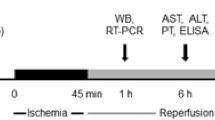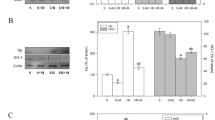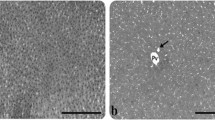Abstract
Background/Purpose
d-Allose, a rare sugar, is one of the potent inhibitors of ischemia/reperfusion injury of the rat liver. To investigate the potency of this powerful agent we examined its effect against ischemia/reperfusion injury and compared it to that of allopurinol and superoxide dismutase.
Methods
Male Lewis rats were given water ad libitum preoperatively for 12 h and anesthetized by isoflurane inhalation anesthesia. Drugs were administered through a polyethylene catheter inserted into the portal vein for 2 h (d-allose), 10 min (allopurinol), or 5 min (superoxide dismutase) before ischemia, and the livers were then subjected to 70% ischemia, induced by crossclamping the vessels to the lateral and median lobes of the liver for 90 min. Rats were divided into four groups: group 1, pretreated with vehicle (normal saline); group 2, treated with d-allose; group 3, treated with allopurinol; and group 4, treated with superoxide dismutase. The effects of the drugs were evaluated by liver hemodynamics, neutrophil count, myeloperoxidase, liver enzymes, and histological studies.
Results
d-Allose improved liver hemodynamics (P < 0.001) and postischemic animal survival (P < 0.05) significantly compared with the control group and nonsignificantly compared with the allopurinol and superoxide dismutase groups. Myeloperoxidase activity in the postischemic liver tissue was decreased significantly (P < 0.05) by d-allose compared with all other treatment and control groups. Neutrophil count was also significantly (P < 0.05) decreased in the d-allose group compared with than that in the control group, as well as the superoxide dismutase group. Only d-allose produced a statistically significant decrease in the level of liver enzymes, compared with levels in the control group.
Conclusions
The moderately protective effect of d-allose, which caused no clinical side effects, is encouraging. d-Allose had the best protective effect against neutrophil-related postischemic injury of the liver tissue, followed by allopurinol and superoxide dismutase. However, a more extensive study is needed to ensure the effects as well as the mechanisms of the effect of this rare sugar.
Similar content being viewed by others
Author information
Authors and Affiliations
About this article
Cite this article
Hossain, M., Izuishi, K., Tokuda, M. et al. D-Allose has a strong suppressive effect against ischemia/reperfusion injury: a comparative study with allopurinol and superoxide dismutase. J Hepatobiliary Pancreat Surg 11, 181–189 (2004). https://doi.org/10.1007/s00534-003-0892-1
Received:
Accepted:
Issue Date:
DOI: https://doi.org/10.1007/s00534-003-0892-1




